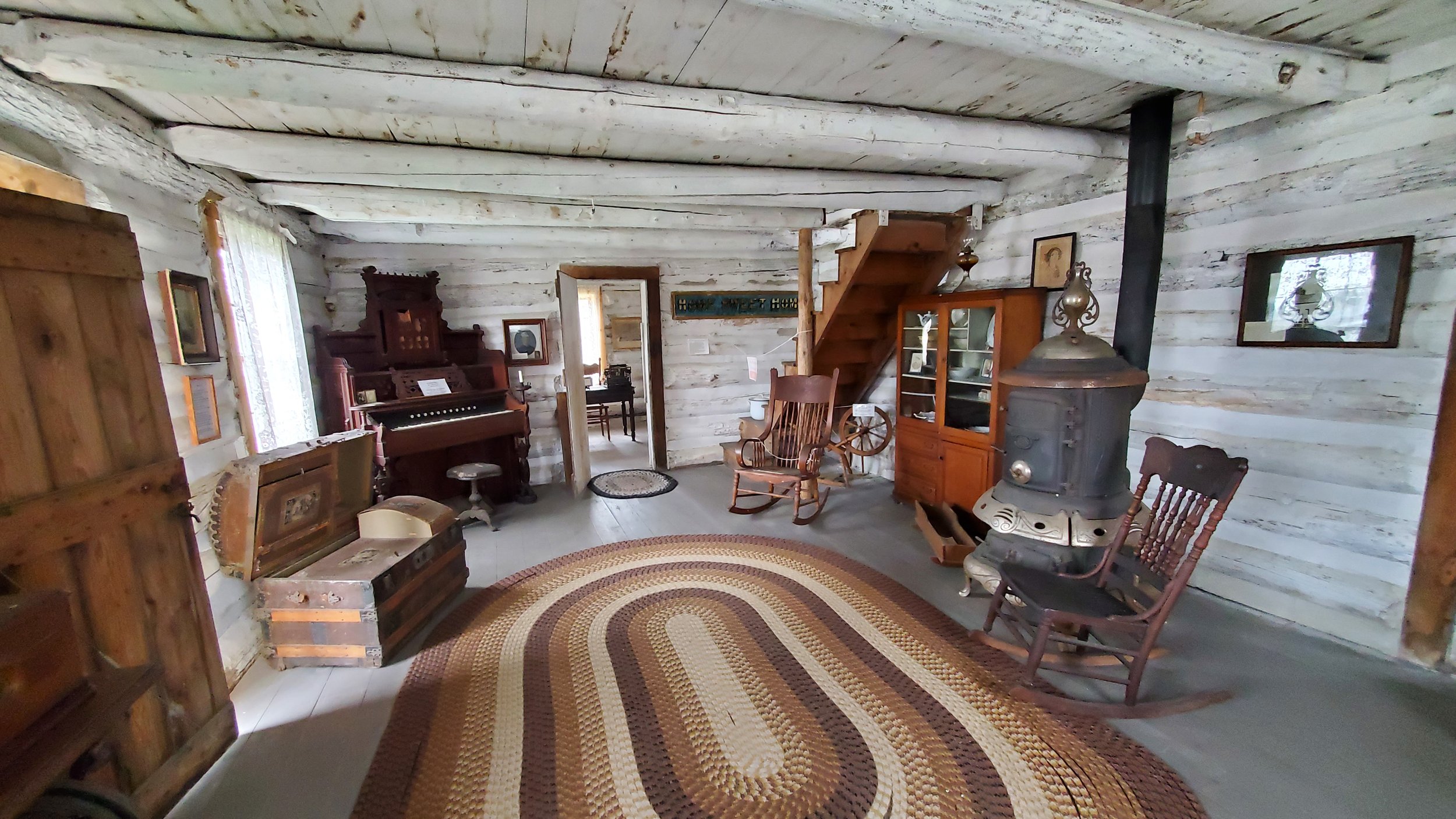The altar in the cabin, ca. 1874, is attributed to Reverend Philip St. Louis who conducted Antigo's first mass.
Chest of drawers attributed to Francois Bernard, Appleton, 1853-1865.
The Deleglise Cabin
Built in 1878 by Antigo’s founding father, Francis Deleglise, with the aid of friends and neighbors, the Deleglise Cabin offers a fascinating glimpse into Antigo’s pioneer past. Tours of the first floor are available, allowing visitors to experience the rustic charm of a frontier log cabin for themselves. Note: a short stairway to the door and uneven floorboards inside may cause difficulty for those with mobility issues.
Building History
The cabin, built by Deleglise, serves as an excellent model of building typology in northern Wisconsin during the period of its settlement. The history surrounding the cabin's construction and evolution are similar to that of homesteads being built throughout the region at the time.
While Antigo is built on traditional Menominee and Ojibwe lands, the first major wave of European settlement began in the 1860s and 1870s. The first log cabins in upper Wisconsin were stopping places along the Lake Superior Trail and Military Road. These log cabins played a very significant role in laying the foundation for the great progress made in opening up the Langlade County area and its resources. As settlers arrived, their first thoughts turned to providing shelter for themselves. Simple cabins, usually fourteen or sixteen feet in length were built using traditional construction techniques. The early homes of upper Wisconsin are basically similar: log structures with minimum openings, lean-to additions, and wood shake or scooped roofs.
Francis Deleglise had the cabin built for his family in 1878. Originally one rectangular building, a small office of log construction and a lean-to clapboard and frame kitchen and bedroom were added soon afterwards. The cabin originally stood on the west bank of Spring Brook, near what later became north Superior Street (Highway 45). The Novotny Brothers saw mill opened in 1879, and with rough sawn lumber available, the scooped roof was removed, the walls raised several tiers, and a new gable roof was erected.
The family hosted services by Father St. Louis, attended by the entire community. A few original artifacts in the cabin included furniture pieces, pictures, and Deleglise's tripod and surveying equipment. The Deleglise family built a second home in 1886 several blocks to the south and the cabin was used for other purposes. The cabin served for a time as the printing office for the New County Republican.
The original cabin was vacant at the time it was moved to the library grounds to be refurbished. In 1914 the thirty-six year old cabin was standing in the way of development. Local officials, rather than tear down the building, arranged to have it moved to the north side of the city library, a Carnegie building and now a museum on the National Register of Historic Places. The Wisconsin Historical Society cites this as one of the first, if not the first, efforts in Wisconsin of a community preserving a log cabin and a part of its heritage. The office and kitchen additions to the cabin were not preserved in the move.
Preserving Francis Deleglise's Legacy
Antigo may be the first city in Wisconsin to make an effort to preserve part of its history. In 1914, as the city grew and downtown buildings proliferated city officials decided to move the Deleglise cabin from its original location near Antigo Lake to what was then the library (now museum). Over 100 years later and after two further moves on the grounds of the library/museum and a major restoration in the 1990s, we still strive to preserve the cabin even as we raise funds to update the museum’s main floor ceiling and lighting. The rumble of traffic on Superior Street and the passing years have caused some deterioration to the chinking. As in the past we turned to Terry Laib for preservation expertise and assistance. Francis Deleglise’s original Antigo home, erected in 1877, is still in good hands and offers visitors a glimpse of pioneer life in Langlade County. The cabin is closed in winter and some cold sensitive artifacts are moved indoors.
Terry Laib specializes in restoration of Wisconsin’s historic structures. Once again he visited Antigo from his home base in New Berlin.. On an unusually warm and pleasant fall day he repaired some of the chinking on the Deleglise cabin.
In 1914 city officials preserved Antigo’s first home by moving it south a few blocks on log rollers from its original location near Antigo Lake to the library/museum. The small addition which had been Deleglise’s office has been removed for the move and is indicated by the white wash at the left end of the cabin.







